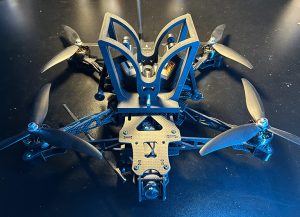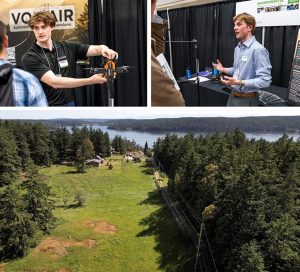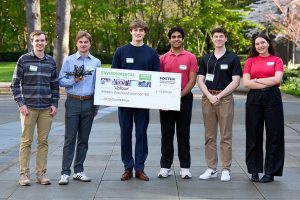Adapted from an article by Ed Kromer / UW College of Engineering

Voltair, a startup co-founded by recent UW ECE alums Ronan Nopp (BSECE ’25) and Hayden Gosch (BSECE ’25), is innovating drone technology to prevent wildfires from igniting along rural power lines. Shown above: A closeup of the Voltair drone prototype. Photo provided by Voltair.
One night last fall, Ronan Nopp and Hayden Gosch were brainstorming names for their newly formed startup that would deploy autonomous, self-charging drones to inspect rural power lines.
After the two electrical and computer engineering seniors debated — and dismissed — scores of candidates, Nopp’s roommate chimed in from the couch: “What about Voltair?”
They liked the mashup of volt (a unit of electricity) and air (the domain of drones) — plus the nod to Voltaire, the Enlightenment thinker. It suited a company whose purpose is to “keep the lights on.”
But Voltair has become more than a clever name.
Its innovative solution to a growing environmental and economic crisis took the grand prize at two UW Buerk Center for Entrepreneurship competitions this year. And its founders have grander aspirations.
“Our mission,” says Nopp, “is to enable autonomous inspections of the power grid with the goal of completely eliminating wildfire risk for public utilities that use our technology.”

(Upper left) Ronan Nopp demonstrates the Voltair drone prototype at the Dempsey Startup Competition. (Upper right) Hayden Gosch explaining how the drone works. Nopp and Gosch set out to reduce wildfire risk with a self-charging, autonomous drone that can inspect rural power lines (shown above) more frequently, effectively, and economically. Photos provided by Voltair and the UW Buerk Center for Entrepreneurship.
Self-inflicted flames
That risk is great — and growing. In a warming world, wildfire season has become longer and more severe. Many fires are caused by breakdowns along the electrical grid. Overgrown vegetation can spark power lines during storms or heat waves. Aging apparatus and insulation can fail at any time.
“The power grid,” says Gosch, “is a ticking time bomb.”
This concerns all public utilities, which collectively bear billions of dollars in wildfire liability. But the risk looms particularly large over small rural cooperative utilities. For them, Gosch adds, “the threat is existential. It’s their single greatest fear.”
These small providers typically make do with skeleton crews of technicians to maintain thousands of miles of power lines. In remote areas, it can take five to 11 years to complete a full manual inspection of the grid.
Voltair’s founders believe they can cover the same ground every 60 days — at less than half the cost per mile.
Airborne and autonomous
Friends since middle school, Nopp and Gosch decided to cap their final year at the UW with a grand engineering and entrepreneurial challenge. Gosch, who had developed a passion for energy infrastructure while interning at Seattle City Light, posed the problem to Nopp, who had developed expertise in commercial drones.
Their solution was simple enough: equip a drone with tracking sensors, position mapping and a self-charging clamp. When its battery runs out, it simply latches onto the power line it’s inspecting. Once recharged, it’s back on its way for continuous inspection and reporting.
Motivated by the Buerk Center’s spring entrepreneurial competitions, Nopp and Gosch developed the Voltair concept last fall and presented it in January at the Science & Engineering Business Association’s annual Science & Technology Showcase.
They gradually added expertise to the enterprise, making connections through the showcase and the Buerk Center’s business plan practicum and resource events.
Sharpening the pitch

The original Voltair team celebrates its grand prize at the UW Environmental Innovation Challenge. Photo: UW Buerk Center for Entrepreneurship
Their “scrappy team of underdogs,” as Gosch calls it, eventually included computer science students Aryan Sharma and Andy Legrand on software and detection systems; aerospace engineering student Hudson Wood on prototype design and competitive strategy; finance and information systems student Hunter McKay on business development; and psychology, communications and business student Isabella Crosby shaping the narrative and marketing materials. Former Husky Warren Weissbluth recently joined to run operations.
“With these startup competitions, it’s all hands on deck,” Nopp says. “A cool technology is great, but the competitions are about articulating your idea, figuring out your go-to-market strategy. These are things that don’t fall neatly into any one degree. It takes everyone working together.”
The Voltair team brainstormed, prototyped, interviewed utility providers and regulators, conducted field studies, launched test flights — and created a coherent and compelling pitch.
Their proposed fleet of drones, equipped with their patent-pending charging system plus an arsenal of sensors, machine vision and Geographic Information System (GIS) mapping, can patrol a network continuously and autonomously, gathering and transmitting visual, thermal and ultrasonic data. Any vegetation encroachment or maintenance concern can be diagnosed on the spot and a crew can be dispatched to remedy the situation — before it becomes a fire hazard.
And these gains in efficiency, accuracy and frequency come with a significant cost saving over manual inspection.
“There’s a huge cost to troubleshooting,” Nopp says. “Our big bet is that our drones can find problems quickly so a utility crew can fix them immediately.
A win-win situation
The seasoned investors and entrepreneurs who judged both the Environmental Innovation Challenge and the Dempsey Startup Competition took that bet. Voltair became the first team to win both competitions in the same year.
“Investors and venture capitalists echo this time and time again: it’s not just the idea, it’s the team behind it,” says Buerk Center Director Amy Sallin. “Voltair set themselves apart by having a cross-disciplinary team that was able to connect not just with the judges who understand drone technology and climate tech, but the dozens and dozens who do not.”
The competitions awarded them valuable cash — $45,000 in total winnings — but also connections and confidence, which have already proved invaluable.
“Wildfire is clearly a huge problem,” Nopp says. “We were cautious at first with our solution. But the more we talked to public utilities and the feedback we got from competition judges reinforced that Voltair is a viable solution that we should pursue.”
Nopp and Gosch are doing just that — Nopp even turned down his dream job at SpaceX to pursue Voltair full time.
This summer, they are refining Voltair’s systems, conducting field tests and meeting with utility operators, insurers, wildfire experts and the FAA. They have also been accepted into the Buerk Accelerator Program to facilitate the leap from competition to marketplace.
Their path may be less taken, but it’s full of purpose.
“This definitely doesn’t feel normal,” Nopp says. “But we have this problem that we’re really passionate about solving and we’re going to keep working on it.”
The Buerk Center: Partnering to spark innovation
The Arthur W. Buerk Center for Entrepreneurship, headquartered at the Foster School of Business, supports and inspires UW students from all disciplines to pursue their entrepreneurial passions. Students gain real-world experience, take innovative courses and connect with Seattle’s entrepreneurial community to bring their ideas to life.
Engineering students regularly participate in the center’s startup competitions and can take courses that lead to minors and certificates in entrepreneurship. When paired with the problem-solving mindset at the core of an engineering education, this experience helps students develop the skills and confidence to drive innovation in any field.
“The Buerk Center provided an invaluable framework to think about startups: what it takes and what is possible,” says Voltair co-founder Ronan Nopp. “It’s a common sentiment that giant companies with huge R&D departments are the place to innovate. But every student who graduates from the UW with an engineering degree has the tools to build something new. There’s nothing stopping you.”

